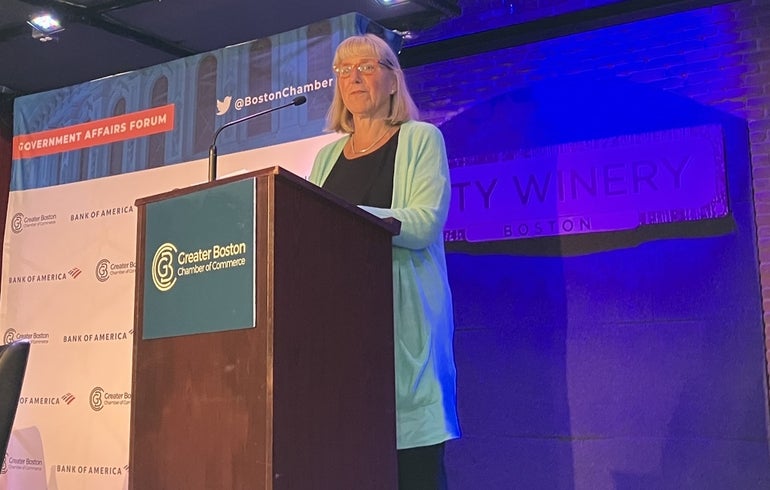Amid debate over how to keep Massachusetts competitive and how tax cuts figure into that goal, Senate President Karen Spilka emphasized Thursday the importance of “shoring up and expanding” the state’s middle class.
Paving lower-income residents’ path to the middle class means focusing on housing, health care and education, Spilka told a Greater Boston Chamber of Commerce breakfast as she cited the Future of the Middle Class Initiative at the Brookings Institute. Spilka said that perspective will enable people to do some of the commonwealth’s “most important jobs,” such as home health aides, child care providers and human services workers.
The Ashland Democrat touted her chamber’s $56 billion budget for fiscal 2024, which would help make community college free for residents and tackle the state’s nursing workforce shortage, among other priorities.
“Rather than to looking at other states to find solutions, my preference is to say, ‘There’s no place like home,’ ” Spilka said. “We have everything we need here to create a thriving, multiracial, diverse and welcoming commonwealth that can be the envy of all the other states.”
Citing rising income inequality in Massachusetts and across the country, Spilka called a “healthy and growing middle class … the most important factor in economic growth.”
The Senate on Thursday is taking up a $590 million tax relief package, which does not call for cutting the short-term capital gains tax from 12 percent to 5 percent — a measure supported by the business community, the House and Gov. Maura Healey, who say it will help from a competitive standpoint.
Spilka attributed that omission to “many discusions” in a Senate Democratic caucus, where the consensus seemed “loud and clear” to put the focus on individuals and working families.
Boosting the Earned Income Tax Credit for low-income families will increase their earning power and, in turn, lead to greater spending on local main streets, Spilka said. She also highlighted the impacts on housing production of Senate plans to expand the Housing Development Incentive Program and the low-income housing tax credit.
“There was a feeling that a billion dollars might just be too much of relief right now, that the senators felt much more comfortable closer to what we did last session,” Spilka said during a question-and-answer segment with Greater Boston Chamber of Commerce President Jim Rooney.
The House felt comfortable with a tax relief package that worth $1 billion, once certain measures are fully phased in.
Senate Ways and Means Chairman Michael Rodrigues, in an interview after Spilka’s remarks, raised the possibility of revisiting the short-term capital gains measure in future deliberations. The Senate’s approach reflects a sharp drop in April tax revenues that he said is now compounded by the state erroneously using $2.5 billion in federal dollars for unemployment benefits during the pandemic, the Westport Democrat indicated.
“This isn’t one and done. I’ve been around for a while — I plan on being around for a while — so we’ll continue to address these issues,” Rodrigues said. “There’s always a path for future tax relief.”
While the state’s new surtax on household income exceeding $1 million creates a “new tax climate,” Spilka pushed back against “a lot of sensational headlines about Massachusetts falling behind other states, either because of people leaving the state in droves or private investment fleeing to more hospitable regions of the country.”
Spilka asserted that reports about outmigration are “overblown” but expressed concern about the largest demographic of adults leaving the commonwealth — namely those ages 26 to 35 who cannot afford housing, child care and other necessities.
“I happen to believe that access to talent — combined with our commitment to a working partnership between government and the private sector — will continue to be a selling point for people looking to start or grow a business here … ” Spilka said. “We need the smarts, energy and creativity of these young people — whether they be recent graduates of our amazing colleges and universities, second-generation immigrants or middle-income residents trying to start careers and families — we need them to keep the commonwealth humming.”
In a report published Wednesday, the Massachusetts Budget and Policy Center said “multiple news articles, op-eds, and think tank reports” are also making “overblown” claims about an exodus of residents, especially high-income households, that are “based on a fundamental misunderstanding of the available data.”
IRS data from 2020-2021, for example, showed tax returns decreased by less than 1 percent compared to the prior year, the center said. And the center also cited census data from July 2021 through July 2022, which captured a net population loss of 7,700 people.
Meanwhile, a May report from the Massachusetts Taxpayers Foundation said the “red flags are waving”when it comes to housing, transportation and migration trends. The state lost 110,000 workers between April 2020 and July 2022, MTF said. That outflow was concentrated among tax filers ages 26 to 35, the MTF said based on IRS data.
Residents are leaving as they contend with unreliable public transit, high housing costs and worsening quality of life, among other factors, MTF said.
Massachusetts has the “fundamentals” right, Spilka said, as she cited examples including an innovation economy and a “willingness to take risks on growing industries like biotech, clean energy, cybersecurity.”
Plus, the state’s “courageous competitiveness” revolves around diversity and the protection of civil rights, Spilka said. She urged private companies to join with the Legislature and Healey in “celebrating” the commonwealth’s values.
“We want them (workers) to know that we are committed — fully committed — to protecting their rights, whether it be for a trans child, a woman not ready to start a family or a father who doesn’t want to worry about his child being killed in a mass shooting in school,” Spilka said. “To all of them, I say, come to Massachusetts … We may not have the year-round warm weather of a Florida or Texas, but we are definitely not afraid to say gay.”

